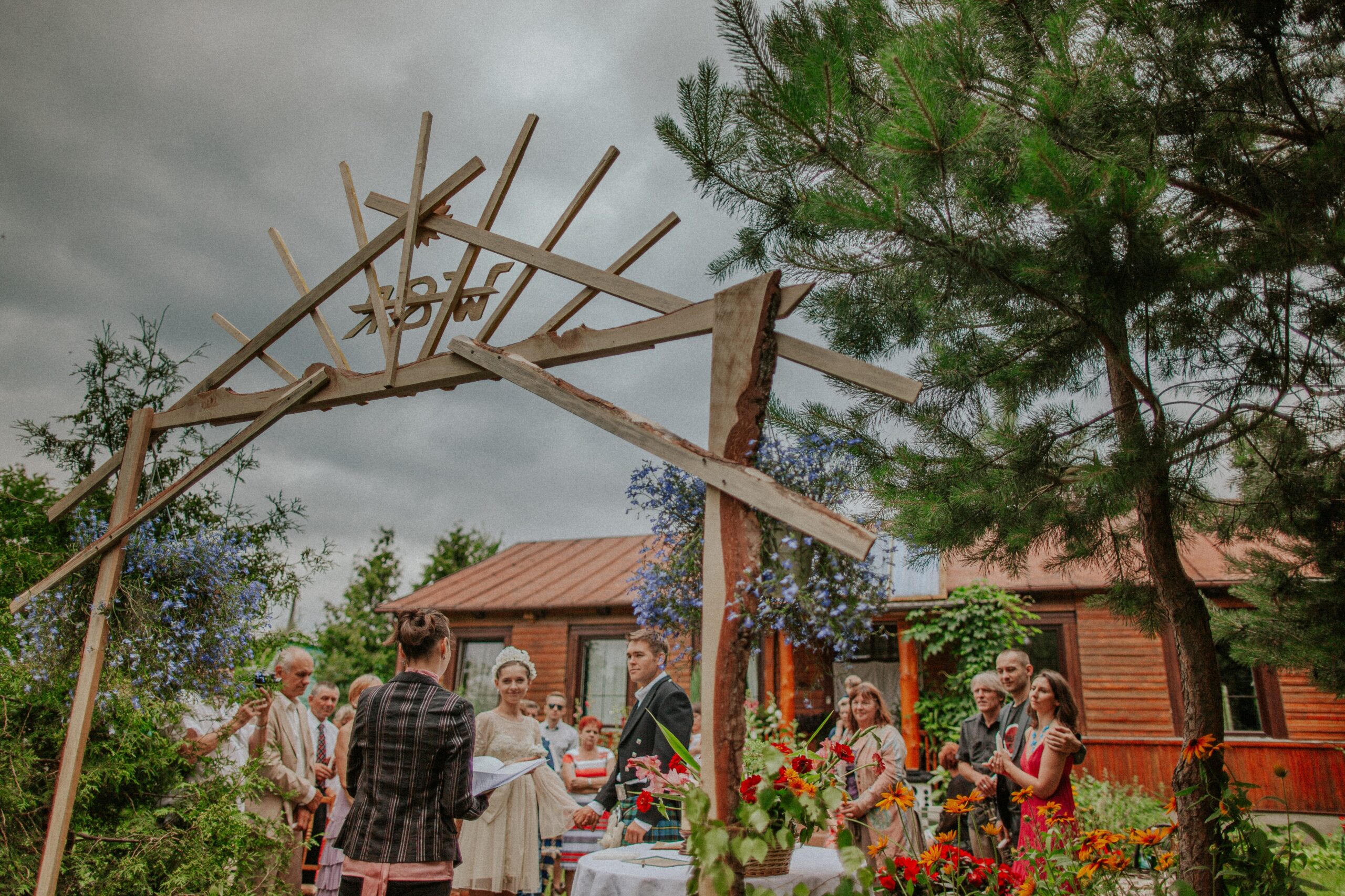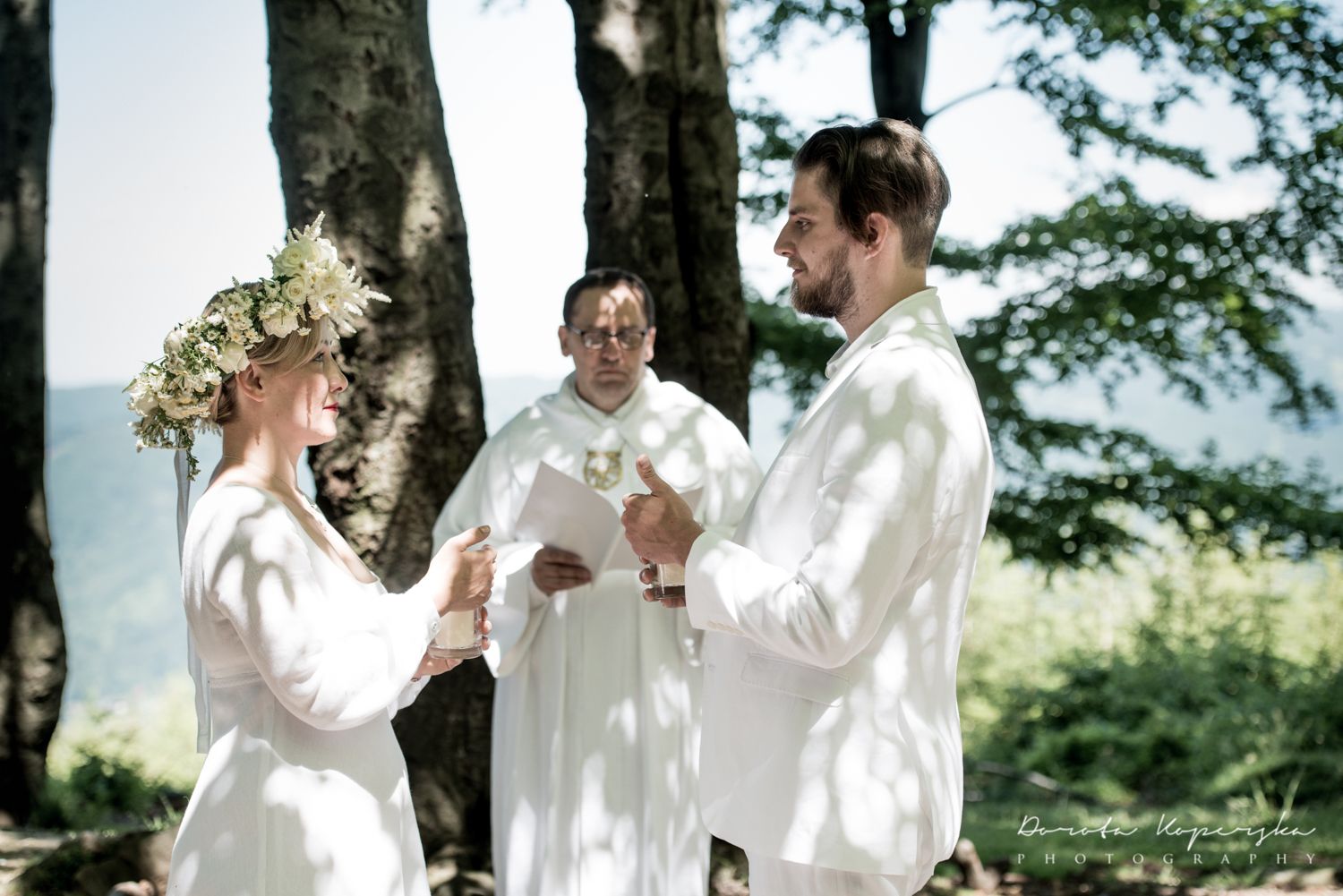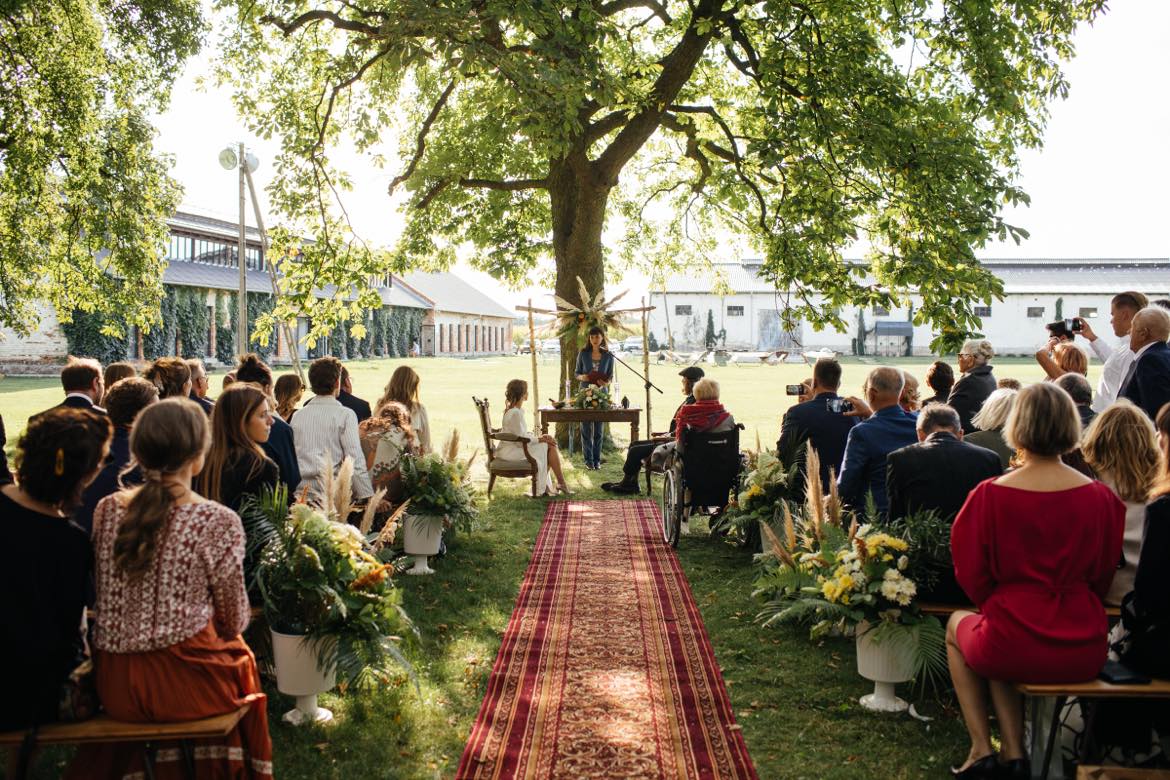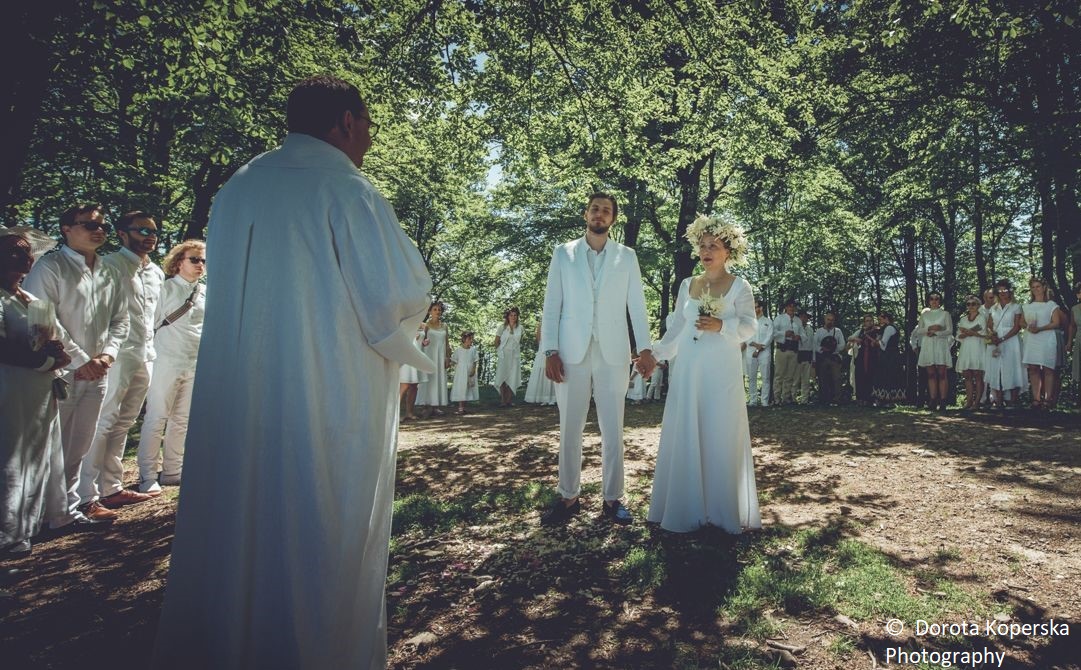By Agata Rejowska (tekst dostępny również w wersji polskiej)
Joanna and Adam’s ceremony took place in a modest garden with decorations alluding to the couple’s shared passion for photography. The pair made their own vows, promising not only to love one another, but also to go on walks and drink coffee together.
But, unlike the majority of weddings in Poland, this one was not presided over by a priest. Nor, in fact, was it administered by a state official. Instead, Joanna and Adam were one of a growing number of couples – hundreds a year before the disruption of the pandemic – choosing to have humanist weddings.

This humanist wedding took place outside the bride’s family home in Poland (photo: Kamila Piech www.kamilapiech.com)
What makes this development particularly striking is that – unlike in some countries, such as Australia, Norway, New Zealand and Scotland – such ceremonies have no legal standing in Poland. To formalise their union, the couples must also have a separate civil ceremony.
Those who choose to have such a wedding are, therefore, making a very conscious decision – and a statement – about their identity. My interviews with many such couples show that their motivations are varied, but a central factor in most cases is a rejection of the dominant role of the Catholic church in Poland, as well as a need to feel authentic and avoid hypocrisy.
Poland’s marital landscape
In Poland, a civil marriage is the only legally binding solution for couples who do not want to marry within a formalised religious organisation. Yet perceptions of weddings held in registry offices are often negative, and couples say that it can seem like more of an administrative appointment than a “big day”.
Aesthetic reasons are also often used against getting married in a registry office. One interviewee told me that the interiors where civil ceremonies take place often look like something “from the communist period”.
Since 2015, civil marriage ceremonies have also been possible outside of the registry office. However, this entails an additional payment of 1,000 zloty (€218), and the chosen venue must be safe and reflect the solemnity of the occasion to ensure that the wedding retains its ceremonial nature. If the official decides that the chosen site does not fulfil these conditions, he or she may refuse to hold the wedding there.

This humanist wedding (also pictured at the top of this article) took place at the peak of a mountain in Cieszyn Silesia (photo: Dorota Koperska)
Furthermore, the entire civil ceremony generally lasts around 15 minutes. The vows are formalised, although after saying them the couple may add a few of their own words, provided that the official agrees. Even these words are subject to the requirement that they should be tactful and respectful.
As a result, for many couples who do not want a religious wedding, a civil marriage is only a compromise, rather than a genuine alternative.
This is where humanist weddings – the first of which in Poland was held in 2007 – come in. Their growing popularity shows an increased need for personalisation of the ceremony.

Photo: Dorota Koperska
It is impossible to give an exact figure for the number of humanist weddings held annually in Poland, as no institution collects such data. But, based on conversations with figures from the industry, I estimate that in 2019, before the pandemic, around 350 such ceremonies took place. Owing to the wide dispersion and weak institutionalisation of these weddings, however, the actual number might be slightly larger.
Given that in that year over 180,000 weddings took place – around 60% of them religious, with 99% of those being Catholic – the annual number of humanist marriages is a proverbial drop in the ocean.
On the other hand, they are already comparable to the number of weddings in Poland’s biggest minority churches. In 2019, the Polish Orthodox church conducted 424 weddings, while the Evangelical Church of the Augsburg Confession in Poland – Poland’s main Protestant denomination – carried out 214.
Meanwhile in Scotland, humanist weddings – which were made legally binding in 2015 – now outnumber Christian ones. In 2019, human ceremonies made up 23% of the country’s weddings, compared to 22% for Christian ones.
More humanists than Christians marry in Scotlandhttps://t.co/LE22z0WBp3
— David Leask (@LeaskyHT) June 26, 2020
An alternative ritual
The original idea behind humanist weddings was for them to provide a certain ritual alternative for people who do not identify with any religion but still want a ceremony that is meaningful for them. Advocates in Poland argued that the symbolic deficiency of civil ceremonies was almost “forcing” some Poles to get married in Catholic churches.
In this sense, humanist weddings are a sign of the processes of secularisation in contemporary Poland that is also visible in many other aspects: for example, the number of men entering the priesthood is falling, growing numbers of school pupils are dropping Catholic catechism classes, and the politicisation of the Catholic church is resulting in high levels of negative appraisals.
However, contrary to certain stereotypes, people opting for humanist weddings are very rarely so-called “militant atheists”. They usually argue that, as they do not identify with the institution of the church, it would be inauthentic if they chose to get married within it solely because of “tradition” or pressure from their families.
As one woman I spoke to put it: “I am…consistent in my convictions and I don’t like the hypocrisy that we don’t go to church every Sunday, but a child has to be christened because ‘it’s the done thing’. So with the wedding, I decided that I didn’t want to make any compromises”.
Humanist weddings in Poland are an indicator not only of secularisation, but also of faith increasingly being consigned to the sphere of private life. Some people have rejected religious institutions while retaining their belief as well as their attachment to various forms of spirituality. One interviewee told me he felt that the Catholic church had “become distant from Jesus’ teachings”.
The latest data from CBOS, a state research agency, show that in 2019 47% of Poles described themselves as regularly practising religion, down from 58% in 1997. Among the young, the figure is just 25%. Meanwhile, the percentages of non-practising believers and non-practising non-believers in 2019 were the highest in history (15% combined).
The reason for the increased popularity of humanist weddings might therefore be a more general trend of abandoning church institutions, which the sociologist Grace Davie calls “believing without belonging”. By leaving the institutions, people create their own religious worldviews, which a humanist ceremony allows them to express.
For example, the groom’s vows at one wedding ended with the words “So help me, Lord Almighty”. In a later interview, however, he explained that he did not need any “intermediary, especially bureaucratised institution”. His partner, meanwhile, was a firm atheist, and the ceremony itself ended with the theme from The Addams Family.
Another wedding I observed, meanwhile, contained Slavic neo-pagan mantras, but also references to Jesus. In this way, humanist weddings fill a certain niche in the Polish “ritual wedding market”, which has previously been limited to church and state institutions.
Growing commercialisation
In Poland, like many developed economies, weddings are increasingly expected to provide an impressive “spectacle”. This might in part conceal a crisis in the institution of marriage: in Poland, one in three now end in divorce. The function of the wedding ceremony itself is also changing, becoming more an indicator of prestige than conformism.
The need to individualise and personalise ceremonies is also growing among couples. “We wanted it to be ‘ours’,” most of them told me. It is common to write one’s own vows and to hold the wedding in untypical places which an official will not want to go to –such as the peak of a mountain – or at an untypical time – such as Saturday at dusk – when they are not at work.

This humanist wedding took place at a former communist-era collective farm that has been turned into a hotel (photo: Maciej Butkowski)
Sometimes couples also want to include their pet dog among the guests. Whereas negotiating such elements in a church or registry office would be impossible, humanist celebrants enthusiastically welcome their clients’ ideas.
Humanist weddings are also an alternative for same-sex couples, whose unions are not recognised by Polish law. Although such a ceremony does not have any legal significance, it is often a watershed event in the couple’s lives, after which their bond is recognised by previously sceptical family members.
These weddings therefore contribute to an increase in the visibility and social acceptance of same-sex unions, which in the long term might also increase the occurrence of such ceremonies. For same-sex couples themselves, it is meaningful that the companies and organisations offering humanist weddings state openly that they are not limited to heterosexual ceremonies, which automatically puts them in the position of clients on the same footing.
The growing popularity of humanist weddings also says a lot about the “ritual wedding market” itself in Poland, revealing its structural limitations. A civil wedding is the only option for heterosexual couples who do not want an institutionalised religious ceremony, while same-sex couples have no right to legalise their unions.
Furthermore, humanist weddings also emphasise the symbolic deficiencies of civil weddings, which many couples tend to treat as an appointment at the registry office rather than a genuine alternative to a church ceremony.
If the trend of distancing from church institutions continues in Poland, the popularity of humanist weddings is likely to grow further. Whether they might at some stage become legally binding, as happened in Scotland in 2005 and the Republic of Ireland in 2012, is another matter.
Translated by Ben Koschalka
Main image credit: Dorota Koperska




















